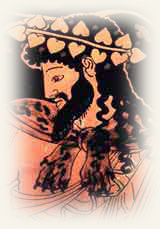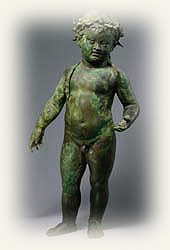The Grapevine Art Salon

Parallel Worlds
In this room of our virtual inn, look for intimations of parallel worlds and experiences in journeying among them.
ANCESTRAL VOICES
Humans throughout world and time have paid particular attention to ancestral spirits:
The cult of ancestor worship is common, although not universal. It has been extensively documented in West African societies (the Bantu and the Shona), in Polynesia and Melanesia (the Dobu and the Manus), among several Indo-European peoples (the ancient Scandinavians, Romans, and Germans), and especially in China and Japan. In general, ancestors are believed to wield great authority, having special powers to influence the course of events or to control the well-being of their living relatives. Protection of the family is one of their main concerns. They are considered intermediaries between the supreme god, or the gods, and the people, and can communicate with the living through dreams and by possession. The attitude toward them is one of mixed fear and reverence. If neglected, the ancestors may cause disease and other misfortunes. Propitiation, supplication, prayer, and sacrifice are various ways in which the living can communicate with their ancestors.
(John A. Saliba at http://mb-soft.com/believe/indexa.html)
And here is a note on the Chinese attitude toward ancestors:
A central feature of Chinese funerals and post-burial mortuary practices has been the transfer of food, money and goods to the deceased. In return the living expected to receive certain material benefits, including luck, wealth, and progeny. The living had the responsibility of sustaining the spirits of the ancestors and protecting their graves. As long as this reciprocal relationship was maintained both the living and the dead benefited. However, should the descendants neglect the spirit of [an] ancestor by failing to make regular offerings at his [or her] grave, the ancestor would be cut adrift in the other-world and seek nourishment and attention elsewhere. Ancestors abandoned in this way became hungry ghosts, a general term for spirits of dead people who did not have any reciprocal relationships with the living. It was not uncommon for an ancestor to make the transition from a benevolent, cooperative spirit into a vengeful, dangerous ghost.,
(WowEssays_com%20-%20Ancestor%Worship.htm)
FAIRY TALES
Baba Yaga
Fairy tales are narratives from world cultures that are shaped and refined by oral tradition before reaching printed form. One of the most unusual characters from fairy tale is the Russian Baba Yaga, or Granny Yaga.
From Helen Pilinovsky's material on Russian fairy tales we find extended coverage of Baba Yaga.
"In Russian Myths, Elizabeth Warner notes that Baba Yaga brings many of the dominant themes of Russian fairy tales together: she travels on the wind, occupies the domain of the leshii, the forest spirits, is associated with death, and is an acceptable surrogate for the generic ved'ma, or witch. Also known as ...'Baba Yaga Bony Leg' she possesses gnashing steel teeth, and penetrating eyes, and, in short, is quite enough to intimidate even the most courageous (or foolhardy, depending on the tale) hero or heroine."
Of her initiatory role, we learn that "Baba Yaga's presence invariably serves as a signifier of change." She does not ride a broom but travels in a mortar and rows with a pestle. "Her home is a mobile hut perched upon chicken legs."
"Baba Yaga's domain is the forest, widely acknowledged as a traditional symbol of change and a place of peril, where she acts as either a challenger or a helper to those innocents who venture into her realm. In Western tales, these two roles are typically polarized, split into different characters stereotyped as either 'witch' or 'fairy godmother.' Baby Yaga, however, is a complex individual: depending on the circumstances of the specific story, she may choose to use her powers for good or ill."
(Russian Fairy Tales, Part II, by Helen Pilinovsky--Autumn 2004 Journal of Mythic Arts
at www.Endicott Studio.com).MYTHS
Dionysos
 The Greek god Dionysos had a grandmother,
The Greek god Dionysos had a grandmother, 
Rhea, a Titan, wife of Kronos and mother of Zeus, Poseidon, Pluto, Hestia, Hera and Demeter. She saved her son Zeus from being swallowed by his father who wanted to prevent his own overthrow and then helped Zeus to overthrow Kronos. Her worship was prominent in Crete, and she was revered in Rome as Magna Mater. As Cybele in the Orient, she cured Dionysos of his madness.
FICTION
When we read fiction that truly engages us, we enter a world that also has, for the time we are in it, a simultaneity, and where we apprehend eternal moments captured first by the writer and now by the reader.

The O’Brian Novels
Patrick O’Brian’s series of twenty novels (or one novel of some 6,600 pages) about British sea captain Jack Aubrey and Irish/Catalan ship’s surgeon Stephen Maturin during the Napoleonic era is a fully rendered parallel world. Synchronously, the inn in London where Stephen Maturin keeps a place to live when he is not at sea and where he often meets his friends to dine, converse, and exchange intelligence information, is called The Grapes. To entertain those who have already read the books and to entice new readers, The Grapevine will offer a series of glimpses into that world. Consider this a book review without comment.
(Note: The O'Brian piece does not feature a grandmother, but in its references to Hamlet's mother and Ophelia, we are made aware of the missing grandmother. If only ...
Anyone looking for absolute consistency of theme at this website is invited to recall that Oscar Wilde called consistency the last refuge of the unimaginative.)
The following are excerpts from a favorite scene in The Surgeon's Mate (New York, W. W. Norton, l980, 205-9):
Jack Aubrey and Stephen Maturin are aboard the Ariel cruising the coast of Denmark, location of Elsinore, home of Shakespeare's Hamlet. Stephen is looking for eider-ducks when Jack says,
"I believe I can show you something that will please you even more. Do you see those green roofs and terraces? That is Elsinore."
Stephen answers,
" 'Elsinore itself? The very Elsinore? God bless my soul: and yours, too, joy. A noble pile. I view it with reverence. I had supposed it to be merely ideal--hush, do not move. They come, they come!' "
He is referring to a flight of ducks. Then, from the castle, comes a blast of mortars.
" 'The Goths,' cried Stephen, glaring angrily at Elsinore. 'They might have hit the birds. These Danes have always been a very froward people. Do you know, Jack, what they did at Clonmacnois? They burnt it, the thieves, and their queen sat on the high altar mother-naked, uttering oracles in a heathen frenzy. Ota was the strumpet's name. It is all of a piece: look at Hamlet's mother. I only wonder her behaviour caused any comment.' "
Amid further shelling from the Danes, they converse with a passenger:
" 'Were you ever in Elsinore, Mr. Jagiello?' asked Jack.
'Oh, many a time, sir,' said Jagiello. 'I know it well. I believe I could show you Hamlet's grave from here.'
'I was really wondering whether they were ten or thirteen inch mortars on the upper terrace,' said Jack, 'but I should be very happy to see Hamlet's grave as well.' "
Jagiello directs their attention to the site, visible from the ship.
" 'So there he lies,' said Jack, his telescope levelled. 'Well, well: we must all come to it. But it was a capital piece, capital. I never laughed so much in my life.'
'A capital piece indeed,' said Stephen, 'and I doubt I could have done much better myself. But, do you know, I have never in my own mind classed it among the comedies. Pray did you read it recently?'
'I never read it at all,' said Jack. 'That is to say, not right through. No: I did something better than that--I acted in it ....' "
Jack tells this story:
" 'I was one of the sexton's mates. There were seventeen of us, and we had real earth to dig, brought from shore; it played Old Harry with the deck, but by God it was worth it. Lord, how we laughed! The carpenter was the sexton, and instead of going on in that tedious way about whose grave it was he made remarks about the ship's company. I was Ophelia too: that is to say, one of the Ophelias.' "
They are interrupted. At the breakfast table, Stephen reopens the conversation with a raised eyebrow, so to speak:
" 'So you were Ophelia in your youth, Captain Aubrey.'
'A part of Ophelia. But in this case the part was greater than the whole: I was called back three times, and the other fellows were not called back at all, even the one that was drowned in a green dress with sprigs. Three times, upon my honour!'
'How did the poor young lady come to be divided up?'
'Why, there was only one midshipman in the flagship pretty enough for a girl, but his voice was broke and he could not keep in tune neither; so for the part where she has to sing, I put on the dress and piped up with my back to the audience. But neither of us was going to be drowned and buried in real earth, Admiral or no Admiral, so that part fell to a youngster who could not defend himself; and that made three of us, do you see.'
Jack smiled, his mind going back to the West Indies, where the performance had taken place; and after a while he sang: Young men will do't An they come to't By cock they are to blame.
Yes, alas; and it all ended unhappy, as I recall.'

'So it did, too,' said Stephen, 'the pity of the world. I believe I shall go upstairs again, if there is no more coffee left. I should be sorry to miss any of the Baltic's wonders, they being, as you might say, some compensation for all the grief there is by land.'